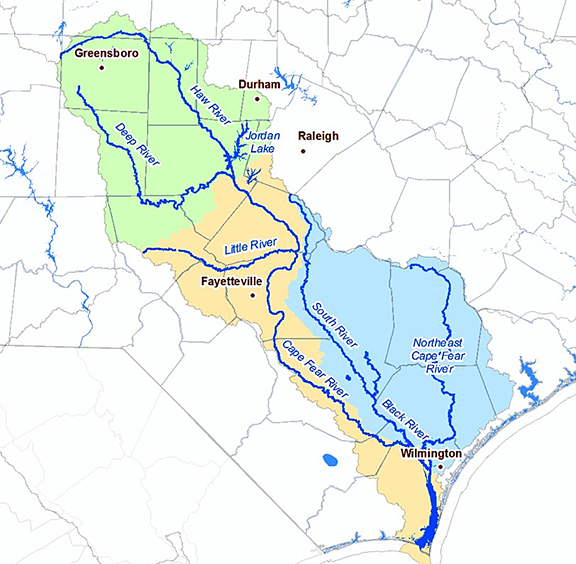Welcome!

Regional wastewater management considered for Randolph, Guilford
ASHEBORO — The good news is, business is flocking to Piedmont North Carolina, with four large projects expected to invest $13 billion to produce 13,000 jobs. Along with Toyota, Wolfspeed, Vinspeed and Boom, some 60,000 new jobs are projected as auxiliary industry and commercial interests move in around them.
The bad news is, the region urgently needs more wastewater treatment capacity to serve all the growth.
For that reason, the Piedmont Triad Regional Water Authority (PTRWA) hosted a meeting on May 9 to address a regional approach to wastewater treatment capacity in Randolph and Guilford counties.
In addition to officials from both counties, municipal representatives were present from Asheboro, Archdale, Greensboro, High Point, Jamestown, Liberty, Pleasant Garden, Ramseur, Randleman and Trinity.
Leading the discussion was Darin Thomas of Raftelis, a consulting firm. According to the company website, “Raftelis helps local governments and utilities thrive by providing management consulting expertise to help transform local governments and utilities.”
Thomas, a vice president of Raftelis who lives in Greensboro, said his firm worked from the beginning with the PTRWA to develop the Randleman Reservoir and water treatment plant that provides water for Greensboro, High Point, Archdale, Jamestown, Randleman and Randolph County.
While lauding the regional approach to water resources, Thomas told the group that wastewater treatment capacity is not keeping up with economic growth.
“Water is looking good, wastewater not so much,” he said. “Many (municipal) plants are at capacity.”
Showing on a map that the Deep and Haw rivers form arms around the region where Toyota Battery and the Wolfspeed microchip plants are being built, Thomas noted that the two rivers are the chief contributors to the Cape Fear River Basin. What’s dumped in those rivers winds up in Wilmington, where the Cape Fear River empties into the Atlantic Ocean.
Thomas said there are two main options for municipalities: Go it alone and face the costs of wastewater treatment or work together as a regional partnership.
Regionalism, he said, would enable the area to sustain economic growth, ensure long-term sewer capacity and leverage economies of scale.
Kevin Franklin, president of the Randolph County Economic Development Corporation, said, “If we’re not ready (for future growth), we could lose out on more opportunities. Infrastructure is a critical need. Our future success depends on collaboration.
“We can see what makes sense through regional collaboration. We can get our heads together to see if it makes sense at the regional level.”
David Lambert of the NC Department of Environmental Quality (DEQ) said his department “is excited about regionalization. Randolph and Guilford are at the center of economic development. What makes North Carolina special is its responsible growth. That was needed with the Toyota project.
“DEQ wants to be a partner,” Lambert said. “Everything we do here winds up in Wilmington. Wastewater here is someone else’s drinking water. There’s lots of (treatment) capacity in the area,” but individual government bodies may be limited in what they can do by themselves, he said.
Lambert went on to say that regionalism can take many forms, depending on the issues in the area.
Bart Kreps, a vice president of Raftelis, listed four points on the financial side of regionalism. He said that if costs are fixed with more volume, unit costs are lower. Regionalism helps avoid duplication of services. It provides a better allocation of risk among partners. And, it provides safe and reliable service to customers at the lowest possible cost.
Doug Bean, a consultant with Raftelis, said there are “lots of different ways to go about (regionalism). It’s what’s best for each region, or a mix of solutions in one region.”
He gave the illustration of the City of Charlotte and Mecklenburg County partnering to provide water, including six small towns in the county. Charlotte even partnered with two towns in Gaston County to develop treatment plants to serve northwestern Mecklenburg County and eastern Gaston County.
Bean said agreements can be tailored around regional factors for technical solutions, financial considerations and governance.
“What does it mean if we work together?” asked Bean. “Tons of models show it works. Agreements can make it all happen. You start with what issues there are.”
Thomas encouraged the representatives to get together and talk about the issues. He asked them to define the needs and interests and to be ready to participate in a forthcoming meeting.
Darrell Frye, chair of the Randolph County Board of Commissioners and chair of the PRTWA’s wastewater committee, said, “We have a long history of regionalism. High Point furnished water to Archdale” until Randleman Lake and the PTRWA treatment plant were completed. “We have the ability to work together as a region. We have a history.”
